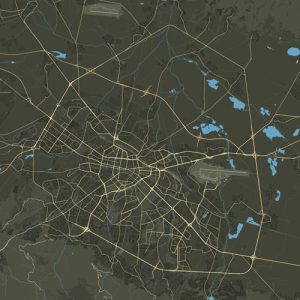Pliska was the first capital of the Bulgarian state, founded by Khan Asparuh, and until 893, in addition to being the capital, it was also one of the largest and richest cities. Today it seems strange that it was built on level ground, but this is understandable for a people who came from the vast steppes. Three defensive belts were built to protect the city from attack – a moat with an earth embankment, a fortress wall and a brick fortification at the citadel itself. The walled complex occupied an area of 23 square kilometers, but it is assumed that the city was much larger – as much as the territory of modern Varna.
The discovery of the first Bulgarian capital, in which Prince Boris baptized the Bulgarians in 864, is a real epic, reminiscent of Schliemann’s search for the legendary Troy. In the 17th century, there was a Tatar settlement in this place, which was called Aboba. In 1884, the then Minister of Education of Bulgaria, Konstantin Irechek, suggested that the ruins near the village are most likely the remains of the city mentioned by the Byzantine chroniclers. Another Czech, Karel Shkorpil, undertook to solve the mystery, who published his opinion that it was there that the capital of Asparukh, Krum, Omurtag and Malamir was located. This determined the interest of the director of the Archaeological Institute in Constantinople to Aboba. Vasil Zlatarski and Karel Shkorpil took part in the excavations from the Bulgarian side. Very soon the latter discovered the two most significant monuments of this place – the Throne Hall and the Great Basilica. Thus, it was indisputably proven that the first Bulgarian capital, Pliska, was located there.
Today, the uncovered remains are preserved and designated as an open-air museum that can be visited at any time, although it is best to visit the exposition to see the objects related to the life, spiritual and material culture of the ancients. residents of the capital.
In Khan Krum’s palace, which occupies 500 square meters, the researchers discovered a water reservoir, spacious bathrooms and secret exits through which, in the event of a siege, its inhabitants could leave it without hindrance. During the reign of Omurtag /814-831/ the city was expanded, the fortress walls were completed and the Throne Hall was built. In the outer city, historians have discovered remains of dwellings, temples, farm buildings and workshops, and near the Eastern Gate is the magnificent palace-church complex, which included a cathedral, an archbishop’s palace and a monastery called the Great Basilica, protected by a stone wall over 4 meters high. Its construction, in all probability, began immediately after the adoption of Christianity and for 250 years it was the center of the spiritual life of the capital and of Bulgaria at that time.
The building, erected on an unknown pagan temple, causes heated debates among scholars. According to some, the building discovered under the foundations of the basilica is the tomb of a man who died as a martyr for the faith /probably the brother of Khan Malamir, Saint Boyan, executed for treason to traditions/. But according to another, more plausible hypothesis, the building was built to serve as a mausoleum for the Bulgarian khans. After the conversion, they tried to. it was turned into a cathedral, but the construction did not last and it had to be completely demolished. Another thing is more important: that, in addition to liturgical books, law, architecture and construction were studied here, and that probably it was here that the disciples of Cyril and Methodius, accepted in 886 by Tsar Boris the First, worked there and started a new literary school of Slavic language.
Work time:
Working hours:
Summer working hours /April – October/: 08.30 – 19.00 h. (without a day off)
Winter working hours /November – March/: 8.30 – 17.00 h. (without a day off)
Entrance fees:
Adult/ Child, student, pensioner – BGN 5/ BGN 2.
Talk in Bulgarian – BGN 10.
Talk in a foreign language – BGN 15.
Contacts:
National Historical and Archaeological Reserve “Pliska”
Address: town of Pliska 9920, municipality Kaspichan, reg. Noisy
Phone: +359 532 32012, 0889 53 98 23.

